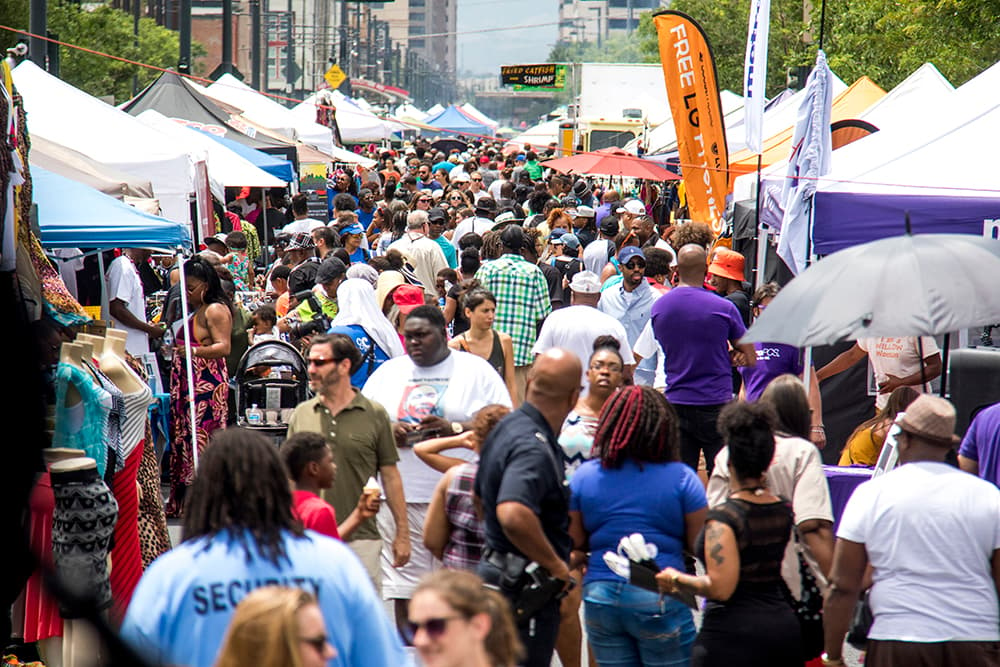
Editor's note: This is part of a series on place names. We occasionally hear from readers who want us to use a different name for a neighborhood than we've used, and we asked some fellow Denverites to do some thinking out loud on names and what they mean.
Read pieces about Stapleton and Northside here.
By Gabrielle Bryant
I was born and raised in Denver, in the suburbs of Montbello and Green Valley Ranch. Since 2010, I’ve worked in Five Points along Welton Street between 26th and 29th. I rented a duplex at the corner of 26th and Downing that was owned by a Black family, who later sold the property to an investor, and I eventually moved to Aurora. Gentrification in Denver, in a nutshell. Although I now reside in CD6, most of my time is spent in what was once known as the “Harlem of the West.”
From working to socializing, it’s one of the only places in the Mile High City where I feel at home. It has the Cheers effect. Sometimes you want to go where everybody knows your name.
Five Points stretches from Downing to the South Platte, but starting in the middle-aughts, the name RiNo started to be applied to the northwest portion of the neighborhood, where new businesses were moving in.
But when asked about the debate over my favorite Denver neighborhood being identified as Five Points or RiNo, I wasn’t quite sure the debate was even a thing. So I went directly to the source. From sitting at the back table of Coffee at The Point, to hanging with friends at Cold Crush, I talked with three individuals to get their thoughts on the so-called name debate.
One stormy afternoon on the patio of Coffee at The Point, I began a conversation with Asia Dorsey, owner of Five Points Fermentation. We’d previously met about a year ago when she had set up shop at an indoor farmer’s market at The Source on Brighton Boulevard. Dorsey grew up on 22nd and Downing, and she is now a hyperlocal business owner who has watched the area transition for more than two decades. I came right out and asked, “What does RiNo signify to you?” Without hesitation, her first response was “violence.” She went on to liken the name change to the traditional European colonial process, citing that the “first thing you do when you move into a place is rename it.” I then asked, “Well, isn’t it just a name?” Adamantly she replied, “It’s not just a name, it’s the erasure of what was there before.”
Later that day, I talked with artist and Five Points community member, Kati Stanford. Although she isn't a Denver native, she’s worked in the area for two years and immediately pointed to the many changes that have proliferated since her time there. The biggest challenge she sees is the “personality” of the neighborhood is changing — and it’s happening fast. Highlighting the many construction projects along Welton Street, she noted that developers and civic leaders have a real chance to honor the history that was once evident in Five Points. She hopes they do more than acknowledge it but ensure that it is preserved.
To wrap up, I headed to Cold Crush. My good friend and favorite party rocker DJ Ktone was up. After taking in the art and snapping a few photos, I stepped outside for a breath of fresh air and ran into club owner, Brian Mathenge. Having read about the upcoming expiration of the club’s lease, I was curious to get his thoughts on the Five Points versus RiNo discussion. He started off by recounting his experience as one of the most successful Black business owners in Denver. Having set up shop in the once forgotten block of 27th and Larimer in 2012, Cold Crush has been a mainstay in Denver’s Black nightlife scene but has always been welcoming to all. Mathenge has been visiting Denver since the ‘90s and recognizes what some refer to as the River North Art District as Lower Five Points. He went on to mention that Five Points is the area where Black and Mexican people have lived for years and are now being “kicked out.” Calling the way gentrification is playing in Denver “heartbreaking,” he sees replacing the historic Five Points name with RiNo similar to others -- a complete removal of the culture that is fighting to remain relevant.
To some, changing the name of this historic neighborhood may be simply that, a name change. To others, it’s about a complete identity shift, playing off the narrative that once shaped society's perception of Five Points and neighborhoods just like it, from Denver’s Northside to Harlem or Brooklyn in New York. Instead of a rebuilding what is and empowering the people to improve their own communities, they are replaced, “forced” to set up shop somewhere else, and the cycle continues. The way I see it, this process is both unfortunate and inevitable. Gentrification of communities that are historically occupied by people of color will happen. It’s our duty to get our heads in the game and prepare ourselves for economic warfare. You cannot win the game if you don’t know it’s being played.

Editor's note: This is part of a series on place names. We occasionally hear from readers who want us to use a different name for a neighborhood than we've used, and we asked some fellow Denverites to do some thinking out loud on names and what they mean.
Read pieces about Stapleton and Northside here.
Gabrielle Bryant is an Emmy Award-winning producer, freelance journalist and television host. She's the president of the Colorado Association of Black Journalists and is an active Denver community member, organizer and advocate.











